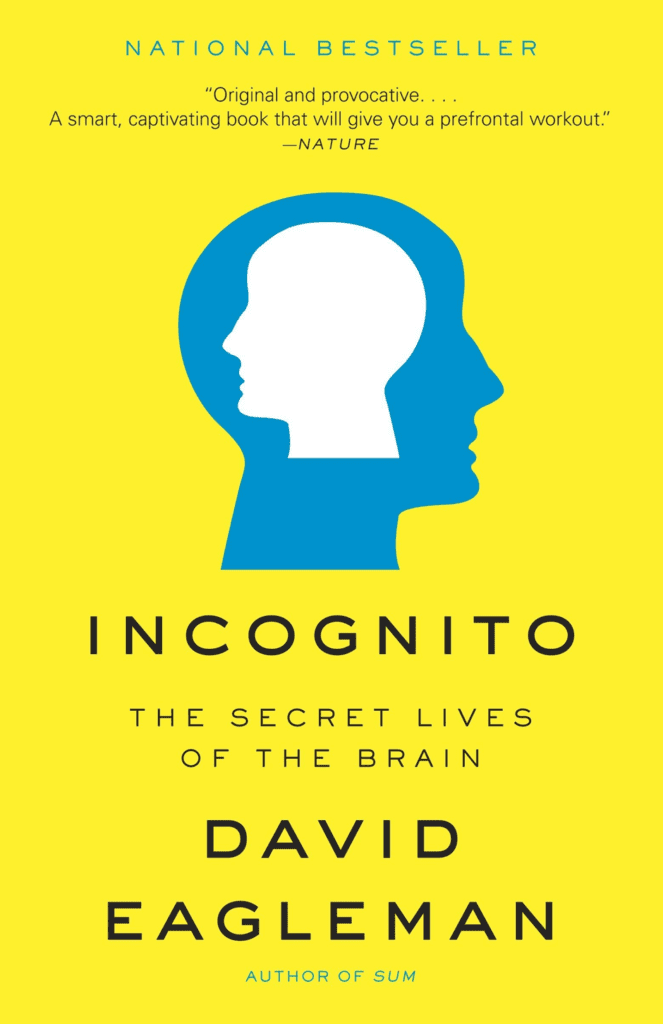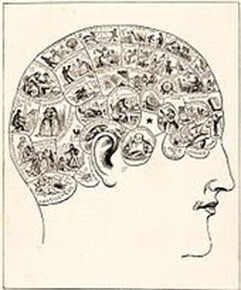By Tami Klein
Posted in perspectives on life, books
Incognito: The Secret Lives of the Brain offers a corrective to many of the mistakes we repeatedly make just because we are only human. Moreover, the facts and explanations it contains are more than interesting; they are fascinating.
About three years ago, this book was recommended in a course on neurology. Since then, I have returned to it, time and time again, both because it is riveting, and also because it is helps me “straighten out” my behavior.

David Eagleman researches the human nervous system with a focus on the unconscious mind. (He also created the Netflix series, “The Creative Brain.”)
“The first thing we learn from studying our own circuitry is a simple lesson: most of what we do an think and feel is not under our conscious control. The vast jungles of neurons operate their own program. The conscious – the I that flickers to life when you wake up in the morning – is the smallest bit of what is transpiring in your brain. Although we are dependent on functioning of the brain for our inner lives, it runs its own show. Most of it operations are above the security clearance of the conscious mind. The I simply has no right of entry.”
Eagleman distinguishes between conscious and subconscious activity in the brain. “Consciousness is the smallest player in the operations of the brain.” Evolution has left a mark on “correct” and “incorrect” for purposes of survival. Consciousness evolved because it provided an advantage, but that advantage is limited.
“You gleefully say, ‘I just thought of something!’ when in fact your brain has performed an enormous amount of work before your moment of genius struck… And who can blame you for thinking you deserve the credit? The brain works its machinations in secret, conjuring ideas like tremendous magic… The brain runs its show incognito.” Eagleman gives a series of examples, personalities from various fields describing how the sparks in their brains are not necessarily them, not necessarily the fruit of conscious thought, as the Swiss psychiatrist “Carl Jung put it, ‘In each of us there is another whom we do not know.’ As Pink Floyd sang, ‘There’s someone in my head, but it’s not me.’”
It is surprising on the one hand, and perhaps sad on the other, but in the end it might be very gratifying to know that “most of what we do and think and feel is not under our conscious control.” How do we know? We don’t know.
To think that our conscious mind is not central to the brain’s activity brain, but only receives echoes from the brain’s activity, leaves us feeling empty-handed – what are our abilities, activities, achievements, the mistakes, large and small, that we have brought upon ourselves? To think that we can absorb only what the brain transmits to our consciousness… Surely, this is a difficult fact to digest. Therefore, friends, as we noted the outset, we cannot even be legitimately angry at whomever is the target of our anger, because that other person is not truly responsible for the issue that generates our response…
Let’s not spoil the mood of our readers by explaining why we shouldn’t even get angry. Read the book, because it offers many fascinating examples, from very diverse fields, and even casts a positive light on the descriptions and explanations.
I considered ending this article with the previous paragraph, but I suddenly felt a need to do more to excite you, dear readers, and persuade you to read Incognito. Why? I’m not sure. So read the following interesting passage as well:
“Spend a moment thinking about the most beautiful person you know. It would seem impossible to gaze upon this person and not be intoxicated with attraction. But everything depends on the evolutionary program those eyes are attached to. If the eyes belong to a frog, this person can stand in front of it all day – even naked – and will attract no attention, perhaps only a bit of suspicion. And this lack of interest is mutual: humans are attracted to humans, frogs to frogs.
“Nothing seems more natural than desire, but the first thing we notice here is that we’re wired only for species-appropriate attraction. This underscores a simple but crucial point: the brain’s circuits are designed to generate behavior that is appropriate to our survival. Apples and eggs and potatoes taste good to us not because the shapes of their molecules are inherently wonderful, but because they are perfect little packages of sugars and proteins: energy dollars you can store in your bank. Because these foods are useful, we are engineered to find them tasty. Because fecal matter contains harmful microbes, we have developed a hardwired aversion to eating it. Note that baby koalas – known as joeys – eat their mothers’ fecal matter to obtain the right bacteria for their digestive systems. These bacteria are necessary for joeys to survive on otherwise-poisonous eucalyptus leaves. If I had to guess, I’d say that the fecal matter tastes as delicious to a joey as an apples does to you. Nothing is inherently tasty or repulsive – it all depends on your needs. Deliciousness in simply an index of usefulness.
“Many people are already familiar with these concepts of attractiveness or tastiness, but sometimes it is difficult to appreciate how deep the evolutionary carving goes. It’s not simply that you are attracted to humans over frogs or that you like apples more than fecal matter – these same principles of hardwired thought guidance apply to all of your deeply held beliefs about logic, economics, ethics, emotions, beauty, social interactions, love and the rest of your vast mental landscape. Our evolutionary goals navigate and structure our thoughts. Chew on that for a moment. It means that there are certain types of thoughts that we can think and whole categories of thoughts we cannot.”
Now, I’m almost certain that you want to read the book, even if you don’t actually do so. But it would be a shame if you don’t.
Incognito: The Secret Lives of the Brain, by David Eagleman
English publisher: Vintage Books




